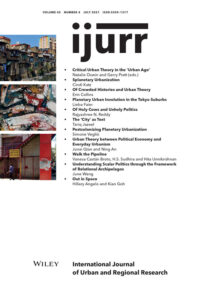This article explores how the encounter between different and unequally positioned trajectories of urbanization has resulted in extreme forms of migrant labor exploitation, recently identified as ‘human trafficking’. Specifically, it examines how a landscape of such exploitation developed in Japan between the late 1970s and early 2000s as Filipina migrants came to work in a growing sex industry for foreign women. In this article I bring a feminist ‘encounters approach’ to planetary urbanization theory to argue that this landscape of exploitation is the consequence of planetary urban involution, a dark dynamic produced through the frictive encounter of discrepantly focused urbanizations in Japan and the Philippines. In this process, as the excesses of postcolonial urbanization in the Philippines rub against those of urbanization in Japan, a former metropole, labor exploitation intensifies, involutes and grows tightly wound in tandem with contemporary geopolitical inequalities. Planetary urban involution thus evokes the grim consequences that occur as growing numbers of displaced and dispossessed postcolonial subjects are drawn into ‘developed’ and ‘globalized’ capitalist economies, where they are widely viewed as disposable workers. In this dynamic, power and domination are exercised at the interface of the discrepant configurations of desire and inequality produced through differently situated urbanization processes.

